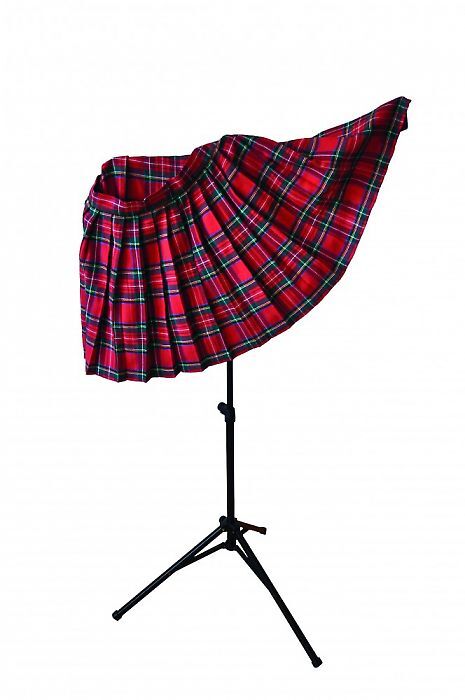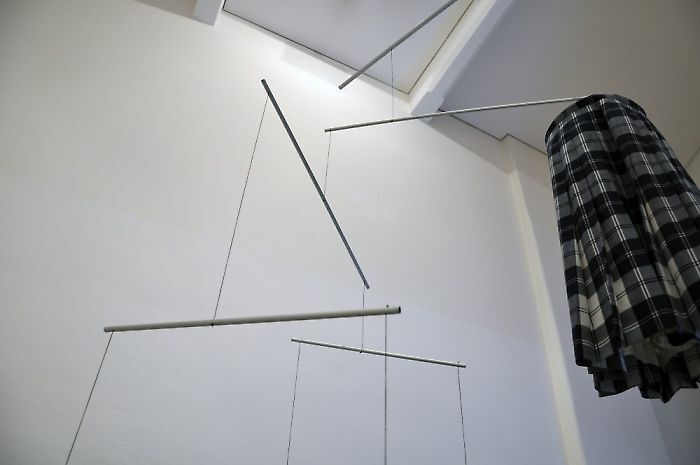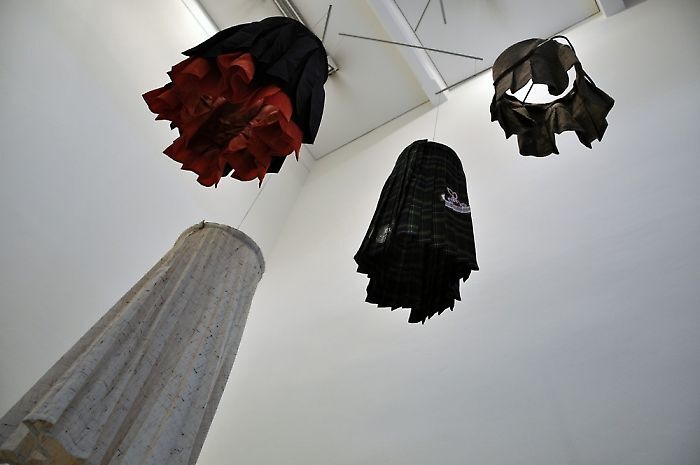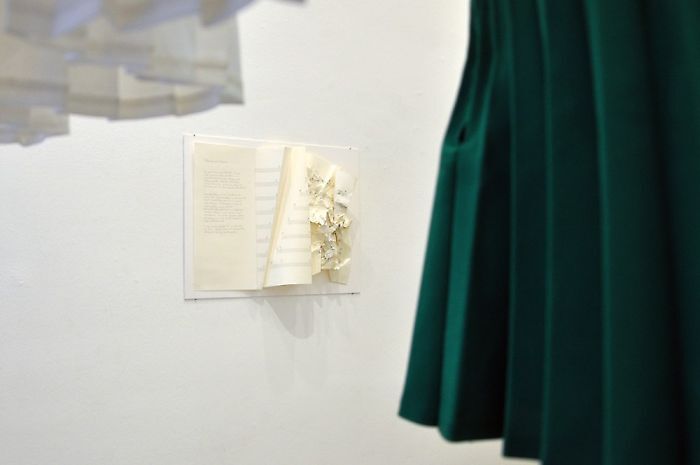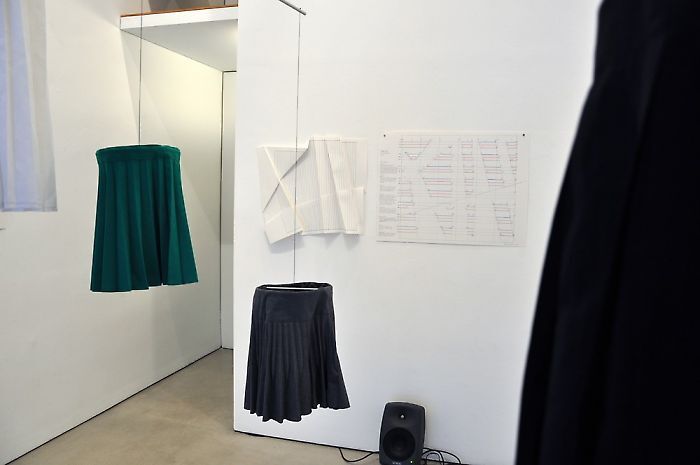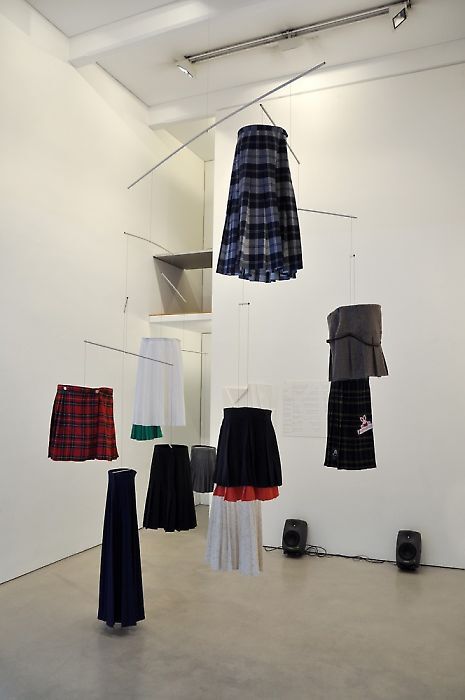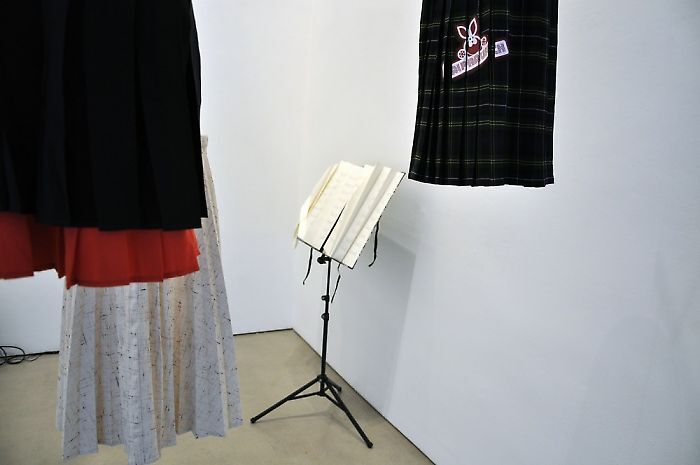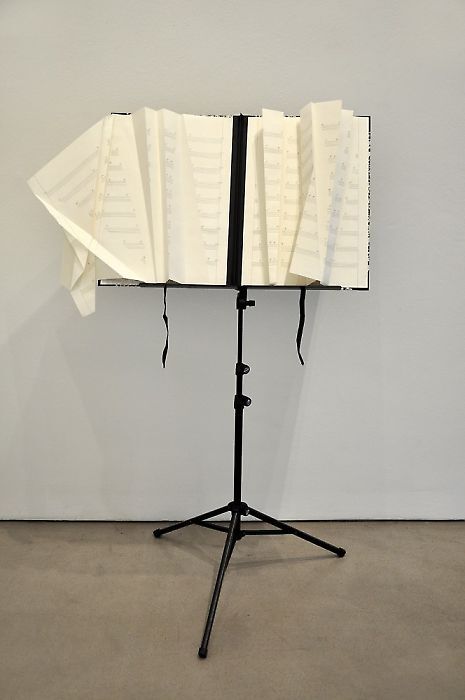—
William Engelen
Faltenrock
“IN SLEEPY VOLUPTUOUSNESS Put yourself in a state of sleepy voluptuousness. Let your erotic feelings, hard to define, come out in your playing. Do not play loudly, but sensitively, find the sound that fits you. Use no extreme differences in pitch and volume; show no great expressivity. Rather, play in an introverted manner.”[1] What initially reads like a guide to meditation or a Feldenkrais exercise is a detailed instruction from one of the fragments in the score-drawing Komponenten (Components) by Dutch artist William Engelen. Engelen’s composition includes thirteen different fragments with vivid titles such as “An einem Sonntag Nachmittag” (On a Sunday Afternoon), “Klotzige Cluster” (Bulky Clusters), “Weiss-schattiert” (In Shades of White), “Ping Pong,” “Das Gespinst” (The Web), or “Bezahlter Beifallsklatscher”: how might a “Paid Applauder” sound? These scores and their musical interpretation form two parts of the installation entitled Faltenrock at Georg Kargl Box. The sound artist Engelen begins with eleven different pleated skirts that he arranges as a mobile. Engelen plays with the historical association of the traditional kilt with music and dance by having the skirts dance, freely hovering in the space. At the same time, the pleats of the skirts shape the scores: Engelen folds blank sheets of staff paper in the style of the various folds of the skirts themselves. Only then does he begin to inscribe them with notation. When the score is completed, the paper is unfolded, creating a kind of relief with gaps at the creases where the folds had been. The musicians translate these gaps as silence, resulting in a sound pattern based on the folds of the skirts. “The artist folds time in this composition. The spatiality of the score determines the spatiality of the sound. Sound, space, and time are closely linked in the musicians’ performance.”[2] And since everything is interrelated in William Engelen’s work, the score for the pleated skirt mobile is interpreted by an accordion, which itself has a body that folds, and an electric guitar, also called Rockgitarre in German: the word Rock in German means both “skirt” and “rock” as a musical style. Engelen does not use classical notation, but invents new graphic systems for his compositions. The scores are often translations of the most mundane things; for example, in Jochen Engelen dissected his houseplant, a Monstera, into its sculptural units, generating material to be played by a saxophonist. Like many of William Engelen’s works, the work Faltenrock moves in the contested field between music, art, and performance. As if life were a musical request program, the artist takes the most trivial components of everyday life—chocolate bars, drops of water, houseplants, growling stomachs, weather fronts—as starting points for his compositions His artistic interest is often directed at exploring social space and its representation. Pitches, language, and recorded sounds form a foundation to depict real space and to make it audible in a new way. His work is investigative and deeply tied to things human. Humor plays a central role: he looks behind things, at their history or the stories they tell. In Fräulein Grosch, he quotes from collective memory by asking various individuals about piano lessons in their youth, something that is part of a proper middle-class upbringing in Europe. When asked about their personal experiences with their piano teacher, those asked have replies such as: “Miss Grosch was a late bloomer, that is, she never found a man, lived on her own and had the practice (piano) a lot.” Or: “My piano teacher was a great woman. By now she’s in her eighties. It was lucky that I already could play piano, because she couldn’t.” He records these stories and combines them with photographs of domestic situations with the piano. Engelen shapes these selective, personal memories to create a common visual and auditory experience. Always in search of new ways of generating sound, William Engelen is deeply rooted in the realm of new and experimental music. The special thing about Engelen’s work lies in the concrete, often everyday foundation of his compositions, easily comprehensible to all.
Text: Marie Duhnkrack
Translation: Brian Currid
[1] “Komponenten für Akkordeon solo,” Music Box (Berlin: Haus am Waldsee, 2011): 60. [2] Katja Blomberg, “Zeit,” in Music Box, 29.
Inquiry
Please leave your message below.
